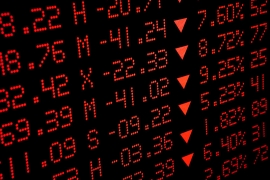Archived article
Please note that tax, investment, pension and ISA rules can change and the information and any views contained in this article may now be inaccurate.

The impact of the covid-19 pandemic is still being felt on the stock market five years after shares, bonds and currencies crashed.
21 February 2025 marks five years since stock markets were on the eve of crashing thanks to the global pandemic. When markets closed on the Friday (21/02/20), investors were nervous about what was unfolding, but few people had any idea that come the following Monday asset prices would experience the fastest decline since the Global Financial Crisis in 2008.
Over a four-week period, markets fell fast and hard, leaving investors panicking and portfolios bashed and bruised. The pace of the recovery also took people by surprise. There were two key triggers that drove shares back up. First, the Federal Reserve implied it would do whatever it took to get the US economy back on track. Second, the creation of covid vaccines cleared the path to recovery for everyday life.
Examples of stocks trading below pre-covid levels |
|||||
FTSE 100 |
Share price change* |
FTSE 250 |
Share price change* |
S&P 500 |
Share price change* |
Persimmon |
-63% |
ASOS |
-88% |
Walgreens Boots Alliance |
-82% |
EasyJet |
-60% |
Aston Martin |
-88% |
Intel |
-68% |
Prudential |
-54% |
Jupiter |
-80% |
Estee Lauder |
-67% |
JD Sports |
-51% |
Hammerson |
-72% |
Warner Bros |
-66% |
Taylor Wimpey |
-50% |
Ocado |
-71% |
Dollar General |
-56% |
Croda |
-40% |
Crest Nicholson |
-67% |
Match Group |
-54% |
Land Securities |
-40% |
Wizz Air |
-66% |
Boston Properties |
-51% |
Schroders |
-35% |
Workspace |
-63% |
Southwest Airlines |
-47% |
Whitbread |
-34% |
Wetherspoon |
-60% |
Stanley Black & Decker |
-45% |
Diageo |
-30% |
Travis Perkins |
-54% |
Lamb Weston |
-39% |
Source: AJ Bell, ShareScope. *Data from 21 February 2020 market close to 11 February 2025
The lasting impact on indices and sectors
While it feels as if the pandemic is history, the knock-on effects are omnipresent for companies on the stock market. In the UK, 162 stocks in the FTSE 350 index are trading below the point when markets slumped around the world in February 2020.
That’s despite most major equity indices now trading higher than pre-covid levels. For example, the Nasdaq has increased by 106%, the Dax is up 62% and the FTSE 100 is up 18% excluding dividends.
Performance of major stock indices since covid pandemic |
|
Index |
Value change* |
Nasdaq (US) |
106% |
S&P 500 (US) |
82% |
Nikkei 225 (Japan) |
66% |
Dax (Germany) |
62% |
CAC 40 (France) |
33% |
FTSE 100 (UK) |
18% |
FTSE 250 (UK) |
-4% |
CSI 300 (China) |
-6% |
Hang Seng (Hong Kong) |
-22% |
Source: AJ Bell, ShareScope. *Data from 21 February 2020 market close to 11 February 2025.
It’s a similar story in the US where 116 stocks in the S&P 500 haven’t recovered from the covid market sell-off.
Admittedly, certain stocks have suffered problems unrelated to the pandemic, but there is a common theme among laggards. They’re victims of the rise in inflation driven by supply chain disruption during covid.
Russia’s invasion of Ukraine exacerbated the situation and caused inflation to become angry, leading to a rapid increase in costs and interest rates, hurting companies and their customers.
Retailers have suffered from a more cautious consumer as interest rates remain high, putting pressure on household finances. Consumers bored at home during the pandemic merrily spent money but they have since taken their foot off the pedal as it looked like interest rates would stay higher for longer. Examples of companies affected: ASOS, JD Sports.
The pandemic knocked airlines off course, with flights cancelled and severe restrictions on travel. Airline debts ballooned and certain companies came out of the pandemic in a terrible financial shape. It’s been one of the last sectors to properly recover but life hasn’t been easy of late, with ongoing cost pressures and earnings hit by having to cut fares. Examples of companies affected: EasyJet, International Consolidated Airlines.
Vaccine companies and lipid suppliers suffered from a drop in income from covid-related treatments as the pandemic faded away. Examples of companies affected: GSK, Croda.
Real estate investors suffered falling property valuations, linked to covid inspiring the rise of hybrid working and office demand weakening, and from higher interest rates. Examples of companies affected: Land Securities, Hammerson.
Housebuilders have suffered from cost inflation, a muddled planning system, residential house price growth slowing after a burst of life between 2020 and 2022, and aspiring homeowners not being able to afford to get on the housing ladder due to high mortgage rates. Examples of companies affected: Persimmon, Crest Nicholson.
Asset managers faced their first real competition from cash savings accounts in more than a decade when interest rates shot up post-covid. Investors could get a decent return on cash in the bank without taking any risk. Outflows have caused asset manager share prices to fall and investors’ interest in the sector to wane. Certain wealth managers have also found life harder post-covid with growth rates not living up to expectations. Examples of companies affected: Schroders, Prudential.
Ways to help you invest your money
Put your money to work with our range of investment accounts. Choose from ISAs, pensions, and more.
Let us give you a hand choosing investments. From managed funds to favourite picks, we’re here to help.
Our investment experts share their knowledge on how to keep your money working hard.
Related content
- Fri, 13/06/2025 - 11:30
- Mon, 09/06/2025 - 10:43
- Fri, 06/06/2025 - 11:25
- Fri, 30/05/2025 - 13:55
